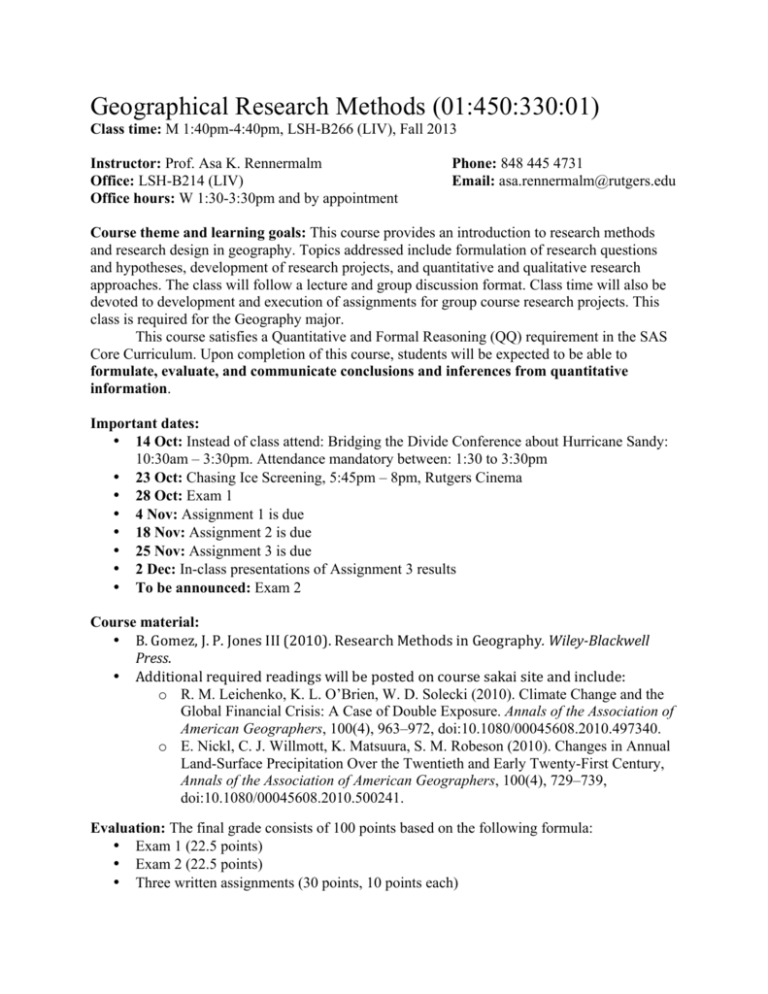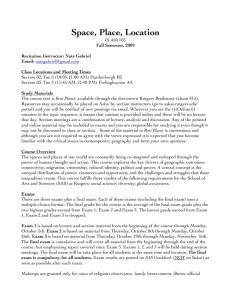Geographical Research Methods (01:450:330:01)
advertisement

Geographical Research Methods (01:450:330:01) Class time: M 1:40pm-4:40pm, LSH-B266 (LIV), Fall 2013 Instructor: Prof. Asa K. Rennermalm Office: LSH-B214 (LIV) Office hours: W 1:30-3:30pm and by appointment Phone: 848 445 4731 Email: asa.rennermalm@rutgers.edu Course theme and learning goals: This course provides an introduction to research methods and research design in geography. Topics addressed include formulation of research questions and hypotheses, development of research projects, and quantitative and qualitative research approaches. The class will follow a lecture and group discussion format. Class time will also be devoted to development and execution of assignments for group course research projects. This class is required for the Geography major. This course satisfies a Quantitative and Formal Reasoning (QQ) requirement in the SAS Core Curriculum. Upon completion of this course, students will be expected to be able to formulate, evaluate, and communicate conclusions and inferences from quantitative information. Important dates: • 14 Oct: Instead of class attend: Bridging the Divide Conference about Hurricane Sandy: 10:30am – 3:30pm. Attendance mandatory between: 1:30 to 3:30pm • 23 Oct: Chasing Ice Screening, 5:45pm – 8pm, Rutgers Cinema • 28 Oct: Exam 1 • 4 Nov: Assignment 1 is due • 18 Nov: Assignment 2 is due • 25 Nov: Assignment 3 is due • 2 Dec: In-class presentations of Assignment 3 results • To be announced: Exam 2 Course material: • B. Gomez, J. P. Jones III (2010). Research Methods in Geography. Wiley-­‐Blackwell Press. • Additional required readings will be posted on course sakai site and include: o R. M. Leichenko, K. L. O’Brien, W. D. Solecki (2010). Climate Change and the Global Financial Crisis: A Case of Double Exposure. Annals of the Association of American Geographers, 100(4), 963–972, doi:10.1080/00045608.2010.497340. o E. Nickl, C. J. Willmott, K. Matsuura, S. M. Robeson (2010). Changes in Annual Land-Surface Precipitation Over the Twentieth and Early Twenty-First Century, Annals of the Association of American Geographers, 100(4), 729–739, doi:10.1080/00045608.2010.500241. Evaluation: The final grade consists of 100 points based on the following formula: • Exam 1 (22.5 points) • Exam 2 (22.5 points) • Three written assignments (30 points, 10 points each) Discussion questions about weekly readings (15 points, 3 points each) Participation (10 points) o Mandatory participation in class group exercises and discussions o Mandatory attendance in class o In class-presentation and reaction to seminar o In-class presentation based on graduate student interview Exams are not cumulative and assess understanding of new material covered between semester start or previous exam. Extra credit is given for attending Geography Seminar Series Lectures (0.2 for attending, 0.1 for asking a relevant question to the speaker, and an extra 0.2 for a 300 word essay about the seminar). Make sure you check in with Prof. Rennermalm at the start or end of the seminar. Seminars are announced on the Department of Geography website: http://geography.rutgers.edu/. Other opportunities may be announced throughout the semester. • • Grading scale follow Rutgers standard scale for undergraduate courses. Grade From To A 90 100 B+ 85 89.99 B 80 84.99 C+ 75 79.99 C 70 74.99 D 60 69.99 F 0 59.99 Discussion Questions: Students are required to develop a list of at least five issues and/or questions to be used in class discussion about each week's reading assignment. These lists need to be written using complete sentences where each question/issue. Students should select issues and questions that are worthy of further discussion with the class. Discussion questions are submitted via the course Sakai site Assignment page, and will be graded on a scale from 0 to 3, with 0 for no submission or extremely poor submission and 3 for excellent. Assignments and course group project: The three assignments will all be part of the group research project. Assignments will be distributed in class and posted on the course web site. All written assignments are handed-in individually. This means that students will work with a group in executing parts of the group project and in the group presentation of the results, but the written assignments must be the student’s own work. Policy regarding class participation, late discussion questions, late assignments, make-up exams, missed class: Active participation during class is expected. Late discussion questions, and late assignments will not be accepted/graded except under extraordinary circumstance (religious observance, bereavement, illness, official university business, jury duty, etc.). Similarly, make up exams and classes are only given for extraordinary circumstances. Arrangement for makeup classes and exams should be made in advance of the class/exam if possible. All absences should be reported by using self-reporting absence system (https://sims.rutgers.edu/ssra//). Accommodations for students with special needs: Students who, because of disability, need accommodation for special needs should arrange this through the Office of Disability Services for Students. Academic integrity: Students are expected to understand and to act in accordance with the Rutgers Academic Integrity Policy: http://academicintegrity.rutgers.edu/policy-on-academicintegrity Schedule (subjected to change) Class Date Topics 1 Sept 9 Introduction about research in geography 2 Sept 16 Thinking about research in geography Readings Gomez and Jones Chapter 1-3 Discussion questions 1 due 3 Sept 23 Ethics and politics of research Literature review process Gomez and Jones Chapter 24 Readings on Sakai Discussion questions 2 due 4 Sept 30 Planning a research project and discussion of course group projects Gomez and Jones Chapter 4 and 5 Discussion questions 3 due 5 Oct 7 Description of quantitative Data Gomez and Jones Chapter 11, 17 Discussion questions 4 due 6 Oct 14 Lecture replaced by “Bridging the Divide” Conference about Hurricane Sandy: 10:30am–4pm. Mandatory participation 1:30pm–4pm. Extra credits for attending earlier part of conference 7 Oct 21 Mapping of quantitative data GIS mapping tutorial Preparation for Chasing Ice screening and discussion 8 Oct 28 Gomez and Jones Chapter 16 and 22 Discussion questions 5 due Exam 1 Work on assignment 1 9 Nov 4 Analysis of quantitative data Gomez and Jones Chapter 10 and 18 Assignment 1 due 10 11 Nov 11 Nov 18 Collecting primary data for quantitative and qualitative analysis Gomez and Jones Chapter 6 and 8 Work on assignment 2 Discussion questions 6 due Survey techniques Gomez and Jones Chapter 12 Group work on survey and plan for data collection. 12 Nov 25 Qualitative data Group work on processing of Assignment 3 survey data Assignment 2 due Gomez and Jones Chapter 13 and 15 Assignment 3 surveys due 13 Dec 2 Group work on processing of Assignment 3 survey data Assignment 3 final write up due 14 Dec 9 In-class presentations of assignment 3 results Final write up is due





